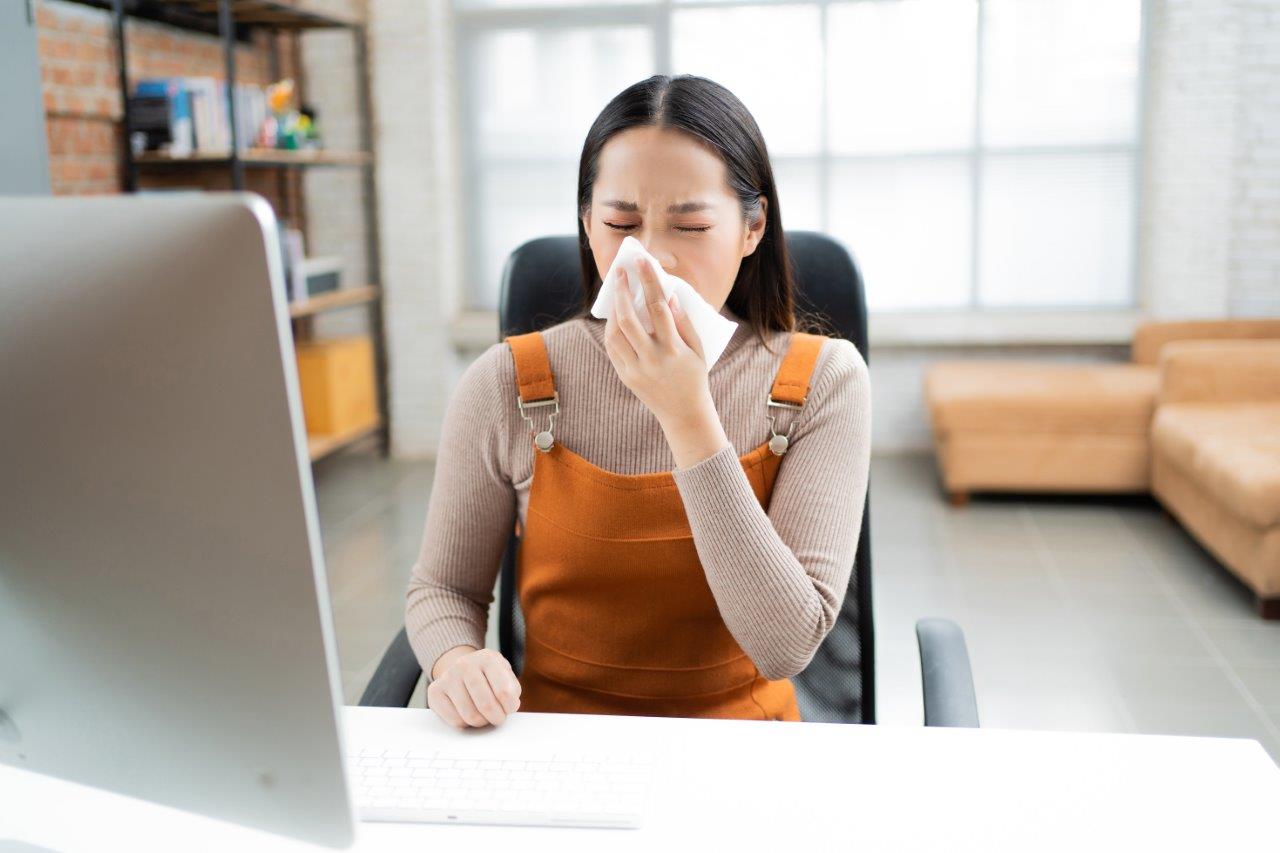Ano ang allergic rhinitis?
- The 2 forms of allergic rhinitis: seasonal and perennial
- Symptoms can vary
- There are risk factors for allergic rhinitis
- You can tell if you have it through physical exams
- There are otc antihistamines and decongestants
If you find yourself sneezing much more than normal, if your nose is regularly runny or stuffy, and if your eyes month and skin often feel itchy, there is a high chance that you may have allergic rhinitis. Some may call it hay fever or allergies. The diagnosis is linked to a combination of symptoms that affect the nose. Or, when your body overreacts to specific objects (or allergens) that don’t cause problems for most people. Allergic rhinitis may occur when you breathe in something you are allergic to like dust, dander, pollen, or food.
This affects two out of ten Filipino adults. Today, we’ll be going more in-depth about what allergic rhinitis is, and some steps you can take to relieve it. Read on for more!
The 2 Forms Of Allergic Rhinitis: Seasonal and Perennial
Ano nga ba ang allergic rhinitis? Madalas na tintatawag na hay fever, ang allergic rhinitis ay isang grupo ng mga sintomas na nakakaapekto sa ilong. Ang allergic rhinitis ay nangyayari kapag ang immune system ng katawan ay nagkakaroon ng reaction sa mga bagay sa kapaligiran. May dalawang klase at form ng allergic rhinitis: seasonal at perennial. Alamin natin ang pinagkaibahan nilang dalawa:
Seasonal
Ang mga aga sintomas ng seasonal allergic rhinitis ay maaaring maramdaman sa mga panahon na taginit o taglamig. Kadalasan, ang nagiging sanhi ng allergic rhinitis ay ang sensitivity ng katawan sa airborne mold spores o pollen na galing sa mga puno o halaman.
Perennial
Ang mga taong may perennial allergic rhinitis ay kadalasan nakakaranas ng mga sintomas sa buong taon. Ang sanhi nito ay ang mga dust mites, pet hair o dander, ipis, o amag.
May mga tao na maaaring maranasan ang dalawang uri ng mga rhinitis na ito. Minsan ang mga symptoms ng mga perennial rhinitis ay lumala tuwing pollen season. Meron ding mga non-allergic na sanhi ng allegic rhinitis. Ito ang mga irritant tulad ng sigarilyo, usok, pabango, cleaning products, at iba pang malakas at matapang na amoy. Wag hayaan na lumalala ang mga sintomas na ito.
Symptoms Can Vary

How can you tell if you have allergic rhinitis? There are some common symptoms. Take note that you’ll usually experience symptoms immediately after coming into contact with your allergen. There are some symptoms on the list such as headaches and fatigue, that may only happen after long term allergen exposure. Observe your body. Common symptoms of allergic rhinitis are:
- Frequent sneezing
- A runny, stuffy, or itchy nose
- Coughing
- Scratchy and itchy throat
- Itchy and watery eyes
- Big, dark undereye circles
- Constant headaches
- Extremely dry and itchy skin
- Hives
- Excessive fatigue
There Are Risk Factors For Allergic Rhinitis
May iba’t ibang mga risk factors na nakakadagdag sa pagkakaroon ng allergic rhinitis. Eto ay ang:
Genetics: Ang mga allergy ay madalas na tumatakbo sa genetics. Tumataas ang iyong risk sa pagkakaroon ng allergic rhinitis kung ang mga magulang mo ay mayroon nito.
Health Problems: Tumataas ang iyong tyansa magkaroon ng allergic rhinitis kung mayoon kang: asthma, eczema, at food allergy.
Surroudings: Tumataas ang risk sa pagkakaroon ng allergic rhinitis kapag ikaw ay expose sa mga iba’t ibang bagay katulad ng: street dust, wood dust, animal dander, textile dust, chemicals, rubber latex, iba’t ibang spices, mites, fumes, and pollution
You Can Tell If You Have It Through Physical Exams

Kung mayoon kang minor allergies, bumisita sa iyong doktor para sa isang physical exam upang malaman kung ikaw ay may allergic rhinitis. Dito malalaman ang pinaka-wastong plano sa pagagamot para dito.
Ang skin prick test ay isa sa pinaka-mabisang exam para sa allergic rhinitis. Ang iyong doctor ay maglalagay ng iba’t ibang substance sa iyong balat upang makita kung ano ang reaksyon ng iyong katawan sa bat isa. Madalas, lumilitaw ang mga maliliit na pulang bukol sa balat kung ikaw ay may allergy.
OTC Antihistamines and Decongestants
When it comes to allergic rhinitis, several medicines can be used to treat it. It is best to visit your doctor to help you determine what medicine is best for you depending on your symptoms, age, and health condition. Antihistamines are the most common medicine for allergies. This helps reduce runny noses, sneezing, and itchiness. This can come in the form of over-the-counter medicines such as Chlorphenamine Maleate Tab or some that will be prescribed by your doctor.
Key Takeaway
If you’ve been experiencing constant itches, runny noses, and sneezing, there may be a chance that you have allergic rhinitis. The descriptions above may help you find out better. Although antihistamines such as Chlorphenamine Maleate Tab by TGP can help you relieve its symptoms, it is still best to visit your doctor to find the best treatment plan for you.